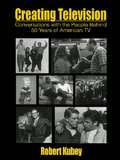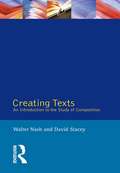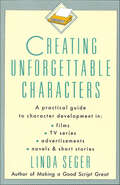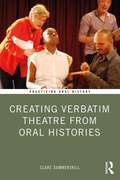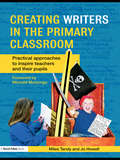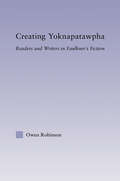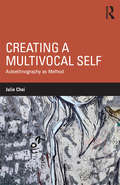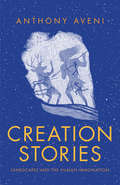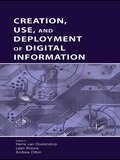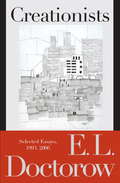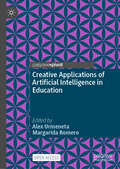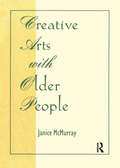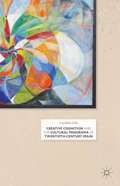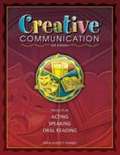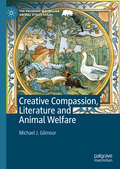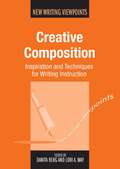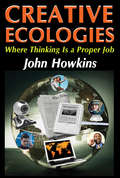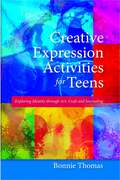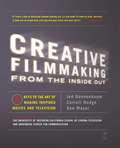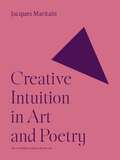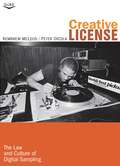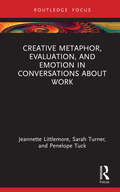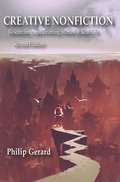- Table View
- List View
Creating Television: Conversations With the People Behind 50 Years of American TV (Routledge Communication Series)
by Robert KubeyCreating Television brings television and its creators to life, presenting fascinating in-depth interviews with the creators of American TV. Having interviewed more than 100 television professionals over the course of his 15 years of research, Professor Robert Kubey presents here the 40 conversations that provide the most illuminating insights about the industry and the people working in it. These interviews bring television's creators to life, revealing their backgrounds, work, and thoughts about the audience and the television programs they create. Each interview tells a compelling tale of an individual's struggles and successes within a complex collaborative and highly commercial medium, offering readers rare insights on the human component in television's development. Featured in this volume are actors, agents, writers, directors, producers, and executives, representing television's earliest days through to the present day. Spanning shows from I Love Lucy and The Tonight Show through to Seinfeld, The Simpsons, and The Sopranos, these creators share the stories of how they gained entry to the industry and built their careers, offering readers a rare opportunity to meet, up close, the people involved in creating many of the most famous and successful programs in the medium's history, and linking the creators' personal histories to the television programs they create. With its unique insights on the people responsible for making television, this volume will be of interest to scholars and researchers in television history, sociology of culture, human creativity, television production, media studies, and mass media ethics. It will also be a popular reader for undergraduate and graduate students in courses addressing television, mass culture, media and society, American Studies, creativity, television history, and media ethics.
Creating Texts: An Introduction to the Study of Composition
by Walter Nash David StaceyCreating Texts emphasises a practical approach to composition and enables students to understand what is involved in the creation of a text and to learn from the practice of other writers. Extensively rewritten and updated from Walter Nash's earlier volume, Designs in Prose, attention is paid to the general theory of composition, in both traditional and original terms, so that students are made familiar with the basic resources of composition, in grammar and in the lexicon.The essence of every chapter is the discussion of examples of text, sometimes devised by the authors, but more often drawn from the work of authors writing in diverse styles of English. This practical approach is most evident in the final section of the book where detailed suggestions for projects and exercises reinforce the connection between theory and practice, and encourage students to develop their creative sense and to adapt their style of writing to fit the particular audience and context. In addition, this section is cross-referenced to the main text to allow students to consult easily the relevant chapter.
Creating Unforgettable Characters: A Practical Guide to Character Development in Films, TV Series, Advertisements, Novels & Short Stories
by Linda SegerFrom a longtime script consultant, “a vital aid to all writers, novelists, and screenwriters . . . invaluable” (Gale Anne Hurd, producer, The Walking Dead and Aliens).In this book, Linda Seger, author of Making a Good Script Great, shows how to create strong, multidimensional characters in fiction, covering everything from research to character block. She introduces concepts designed to stimulate the creative process, combining them with practical techniques and exercises. She also offers specific advice on creating nonfiction and fantasy characters, and case studies of such classics as Ordinary People and the sitcom Cheers.Addressing topics from backstory development to character psychology to avoiding stereotypes, Creating Unforgettable Characters is an excellent resource for writers in any genre or creative field. Interviews with successful professional writers complete this essential volume.
Creating Verbatim Theatre from Oral Histories (Practicing Oral History)
by Clare SummerskillOffering a roadmap for practicing verbatim theatre (plays created from oral histories), this book outlines theatre processes through the lens of oral history and draws upon oral history scholarship to bring best practices from that discipline to theatre practitioners. This book opens with an overview of oral history and verbatim theatre, considering the ways in which existing oral history debates can inform verbatim theatre processes and highlights necessary ethical considerations within each field, which are especially prevalent when working with narrators from marginalised communities. It provides a step-by-step guide to creating plays from interviews and contains practical guidance for determining the scope of a theatre project: identifying narrators and conducting interviews, developing a script from excerpts of interview transcripts and outlining a variety of ways to create verbatim theatre productions. By bringing together this explicit discussion of oral history in relationship to theatre based on personal testimonies, the reader gains insight into each field and the close relationship between the two. Supported by international case studies that cover a wide range of working methods and productions, including The Laramie Project and Parramatta Girls, this is the perfect guide for oral historians producing dramatic representations of the material they have sourced through interviews, and for writers creating professional theatre productions, community projects or student plays.
Creating Writers in the Primary Classroom: Practical Approaches to Inspire Teachers and their Pupils
by Miles Tandy Jo HowellTeachers in English schools have now had ten years of prescriptive national literacy strategies and it is time for a new approach. This book encourages children from their early years to think of themselves as writers who have something to write and know how to write it. Creating Writers in the Primary Classroom offers an exciting and refreshing approach to teaching writing in the primary school with very practical suggestions to help build a community of writers in your school where everyone writes and loves writing. Building on the research of recent years and with whole-curriculum provision, it shows teachers how to actively engage children in the writing process, excite them about what they can achieve and help all children to think of themselves as writers. The book begins with a clear analysis of what real writers really need and has chapters on working outdoors, using the very best of children’s literature, drama and imaginative play, as well as sounds and images. It also features a chapter on practical, productive planning, including two case studies that show the approaches in use at schools. Creating Writers in the Primary Classroom is packed with practical advice, games and strategies for the classroom based on the authors’ successful experience as teachers and in-service providers. These new approaches will enable teachers to get their children up and moving, experiencing what writers experience, feeling what writers feel and, most important of all, writing how writers write.
Creating Yoknapatawpha: Readers and Writers in Faulkner's Fiction (Studies in Major Literary Authors)
by Owen RobinsonCreating Yoknapatawpha is a study of the crucial interplay of reading and writing processes involved in constructing the textual environment of William Faulkner’s work, and the nature and significance of the world created by these many forces. Yoknapatawpha County, the author contends, is the product of these mainly mental processes of construction at all levels, and it is in the similar and even analogous situations that exist between readers and writers of and in the fiction that the dynamic of Faulkner’s work is most keenly discovered. The book discusses novels from throughout Faulkner’s career, and uses elements of Bakhtinian and reader-response theory, among others, to explore its subject, eschewing the limited focus both of strictly formal and more content-oriented approaches, and demonstrating the need for readers and writers to work together, whether harmoniously or otherwise. By examining the fictive nature of Yoknapatawpha, and the requirement for everybody to participate fully in its creation, we can establish useful bases for investigations into the ‘real world’ issues with which Faulkner is so concerned.
Creating a Freelance Career
by Jill L. FergusonCreating a Freelance Career covers everything anyone needs to know about becoming a freelance writer, graphic designer, copy editor, artist, musician or any other creative occupation. It includes chapters on how to get started with your career and where to look for work, how to write pitch or query letters, how to work with contract employers, and how to build and sustain your business. Lingo necessary for successfully navigating the freelance world is defined throughout. Author Jill L. Ferguson, an experienced freelance professional and educator, guides you through finding success in the gig economy, discussing how to pursue freelancing with an entrepreneurial spirit. Creating a Freelance Career includes examples of what to do, and what not to do, when pursuing freelance projects, and includes perspectives from additional real-life professionals who have found success in their fields.
Creating a Multivocal Self: Autoethnography as Method
by Julie ChoiShowcasing a new methodology in language learning and identity research, this carefully conceptualized, innovative book explicates the use of autoethnography as a way of re-imagining one’s sense of linguistic and cultural identity. A key work for researchers and students in Applied Linguistics and Language Education, it addresses fundamental aspects of research methodology and explores substantive issues relating to individual dimensions of multilingualism. Choi shows convincingly how the learning of a language is inseparable from one’s constant searching for a voice, a place, and a self in this world, demonstrating the importance of interrogating what lies behind everyday life events and interactions—the political and ethical implications of the utterances, thoughts, actions, and stories of the self and others. Themes of authenticity, illegitimacy, power relations, perceptions of self/other, cultural discourses and practices, and related issues in multilingual identity development surface in the multi-modal narratives. Chapters on methodology, woven through the book, focus on the process of knowledge production, approaches to writing narratives, the messiness of research writing practices, and the inseparability of writing and research.
Creation Stories: Landscapes and the Human Imagination
by Anthony AveniAn accessible exploration of how diverse cultures have explained humanity&’s origins through narratives about the natural environment Drawing from a vast array of creation myths—Babylonian, Greek, Aztec, Maya, Inca, Chinese, Hindu, Navajo, Polynesian, African, Norse, Inuit, and more—this concise illustrated book uncovers both the similarities and differences in our attempts to explain the universe. Anthony Aveni, an award-winning author and professor of astronomy and anthropology, examines the ways various cultures around the world have attempted to explain our origins, and what roles the natural environment plays in shaping these narratives. The book also celebrates the audacity of the human imagination. Whether the first humans emerged from a cave, as in the Inca myths, or from bamboo stems, as the Bantu people of Africa believed, or whether the universe is simply the result of Vishnu&’s cyclical inhales and exhales, each of these fascinating stories reflects a deeper understanding of the culture it arose from as well as its place in the larger human narrative.
Creation, Use, and Deployment of Digital Information
by Herre Van Oostendorp Leen Breure Andrew DillonThe aim of this book is to present results of scientific research on how digital information should be designed and how artifacts or systems containing digital content should maximize usability, and to explain how context can influence the nature and effectiveness of digital communication. Using a philosophical, cognitive, and technical standpoint, the book covers the issue of what digital information actually is. The text also presents research outcomes from the perspective of research in information science--broadly construed--a term now used to cover a range of theoretical and practical approaches.Creation, Use, and Deployment of Digital Information is broken down into three parts:*Part I presents information on how electronic documents can be realized--the complexities, alternatives, functions, and restrictions are treated here.*Part II discusses how human beings process information and how technical solutions can satisfy human restrictions.*Part III treats the context in which digital information processing and deployment takes place.The book has much to offer to academics in many disciplines, including science, the arts, psychology, education, and the information and computing sciences.
Creationists
by E. L. DoctorowE. L. Doctorow is acclaimed internationally for such novels as Ragtime, Billy Bathgate, and The March. Now here are Doctorow's rich, revelatory essays on the nature of imaginative thought. In Creationists, Doctorow considers creativity in its many forms: from the literary (Melville and Mark Twain) to the comic (Harpo Marx) to the cosmic (Genesis and Einstein). As he wrestles with the subjects that have teased and fired his own imagination, Doctorow affirms the idea that "we know by what we create."Just what is Melville doing in Moby-Dick? And how did The Adventures of Tom Sawyer impel Mark Twain to radically rewrite what we know as Huckleberry Finn? Can we ever trust what novelists say about their own work? How could Franz Kafka have written a book called Amerika without ever leaving Europe? In posing such questions, Doctorow grapples with literary creation not as a critic or as a scholar-but as one working writer frankly contemplating the work of another. It's a perspective that affords him both protean grace and profound insight. Among the essays collected here are Doctorow's musings on the very different Spanish Civil War novels of Ernest Hemingway and André Malraux; a candid assessment of Edgar Allan Poe as our "greatest bad writer"; a bracing analysis of the story of Genesis in which God figures as the most complex and riveting character. Whether he is considering how Harpo Marx opened our eyes to surrealism, the haunting photos with which the late German writer W. G. Sebald illustrated his texts, or the innovations of such literary icons as Heinrich von Kleist, Harriet Beecher Stowe, and Sinclair Lewis, Doctorow is unfailingly generous, shrewd, attentive, surprising, and precise.In examining the creative works of different times and disciplines, Doctorow also reveals the source and nature of his own artistry. Rich in aphorism and anecdote, steeped in history and psychology, informed by a lifetime of reading and writing, Creationists opens a magnificent window into one of the great creative minds of our time.From the Hardcover edition.
Creative Applications of Artificial Intelligence in Education (Palgrave Studies in Creativity and Culture)
by Margarida Romero Alex UrmenetaThis open access book explores the synergy between AI and education, highlighting its potential impact on pedagogical practices. It navigates the evolving landscape of AI-powered educational technologies and suggests practical ways to personalise instruction, nurture human-AI co-creativity, and transform the learning experience. Spanning from primary to higher education, this short and engaging volume proposes concrete examples of how educational stakeholders can be empowered in their AI literacy to foster creativity, inspire critical thinking, and promote problem-solving by embracing AI as a tool for expansive learning. Structured in three parts, the book starts developing the creative engagement perspective for learning and teaching to then present practical applications of AI in K-12 and higher education, covering different fields (teacher education, professional education, business education) as well as different types of AI supported tools (games, chatbots, and AI assisted assessment). It also delves into the ethical considerations, policy implications, and the central role educators play in harnessing the power of an AI informed educational experience.
Creative Arts With Older People
by Janice McmurrayWith this insightful and intelligent book, professionals can help institutionalized older adults express themselves creatively. One of only a few books on expressive arts for older people, this unique, new volume is ideal for professionals who provide art activities for residents in adult homes and retirement communities.Creative experience can facilitate the expression of ideas and feelings, increase sensory stimulation, improve self-esteem, and improve social relationships. Creative Arts With Older People provides time-tested suggestions to stimulate the creative process among older adults, resulting in numerous physical, psychological, and social benefits. The author, an artist and a social worker, describes dozens of activities that have proven effective in her many years of working with older people--painting, movement, poetry, sculpting, puppetry, dramatic expression, and more. She explains the goals and advantages of each activity, includes a list of materials needed, and details the step-by-step process for conducting each activity.Creative Arts With Older People is a practical and valuable book for activity directors in adult homes and adult health care units, and workers in adult day care centers, adult psychiatric facilities, and senior centers.
Creative Cognition and the Cultural Panorama of Twentieth-Century Spain
by Candelas GalaThis multidisciplinary study focuses on the creative state as the nucleus of the work of numerous poets, artists, and philosophers from twentieth-century Spain. Beginning with cognitive science, Gala explores the mental processes and structures that underline creative thinking, for poets like Jos#65533; Mar#65533;a Hinojosa, Clara Jan#65533;s, and Jorge Guill#65533;n.
Creative Communication: Projects in Acting, Speaking, Oral Reading
by Fran Averett TannerIn this book, the subjects of public speaking, oral communication, and acting are thoroughly reviewed.
Creative Compassion, Literature and Animal Welfare (The Palgrave Macmillan Animal Ethics Series)
by Michael J. GilmourThis book examines animal welfare themes in fiction, and considers how authors of the last two centuries undermine dominative attitudes toward the nonhuman. Appearing alongside the emerging humane movements of the nineteenth century and beyond is a kind of storytelling sympathetic to protectionist efforts well-described as a literature of protest. Compassion-inclined tales like the Dolittle adventures by Hugh Lofting educate readers on a wide range of ethical questions, empathize with the vulnerable, and envision peaceful coexistence with other species. Memorable characters like Black Beauty and Beautiful Joe, Ivan the gorilla and Louis the trumpeter swan, Hazel and Cheeta, Mr. Bultitude and Doctor Rat do not merely amuse. They are voices from the margins who speak with moral urgency to those with ears to hear. This broad survey of ethical themes in animal fiction highlights the unique contributions creative writers make toward animal welfare efforts.
Creative Composition
by Lori A. May Danita BergFor decades theorists have opined that the lines between creative writing and composition need to be lifted, yet little has been written about the pedagogical methods that allow a cohesive approach between the disciplines. This book brings together contemporary authors and well-respected creative writing instructors and theorists to explore ways creativity in composition may be encouraged in student writers. The question in this anthology is not 'Can writing be taught?' but 'How can we inspire students to embrace the creative process no matter what they write?' This book offers multiple strategies to merge the best practices of teaching writing, regardless of the genre.
Creative Ecologies: Where Thinking Is a Proper Job (Creative Economy And Innovation Culture Se Ser.)
by John Howkins Bronislaw MalinowskiThe main question of our age is how we live our lives. As we struggle with this question, we face others. How do we handle ideas and knowledge, both our own and those of others? What relationship to ideas do we want? Whose ideas do we want to be surrounded by? Where do we want to think? Most choose, or have the choice made for them, according to what family, colleagues, and friends do and say and what we read about, and a more or less rational calculation of the odds.Modern ecology results from the shift in thinking generated by quantum physics and systems theory, from the old view based on reductionism, mechanics, and fixed quantities to a new view based on holistic systems where qualities are contingent on the observer and on each other. This perception changes how people treat ideas and facts, certainties and uncertainties, and affects both art and science. Worldwide it is part of the process of understanding the current crisis in the environment, and the balance of economy, creativity, and control required in our response.The book's starting point is the growing role that information has played in industrial economies since the 1800s and especially in the last thirty years. It is an attempt to identify ecology of thinking and learning. It is also based on the need to escape from old, industrial ways and become more attuned to how people actually borrow, develop, and share ideas. Throughout the book, Howkins asks questions and offers signposts. He gives no guarantee that creative ecologies will be sustainable, but shows what should be aimed for.
Creative Expression Activities for Teens
by Bonnie ThomasCoping with life's stresses is difficult for everybody, but can be especially challenging for teenagers, who often feel isolated and misunderstood. Creative expression through art, craft, and writing is a natural and effective way of helping young people to explore and communicate personal identity. This book is bursting with art and journal activities, creative challenges, and miniature projects for bedrooms and other personal spaces, all of which help teenagers to understand and express who they are and what is important to them. These fun ideas can be tailored to suit the individual, and require minimal equipment and even less artistic know-how, so can be enjoyed by all. The book concludes with a useful section for counselors and other professionals who work with young people, which explains how these activities can be incorporated into treatment goals. This imaginative and insightful book is a useful resource for all therapists, social workers, and counselors who wish to encourage self-expression in teenagers.
Creative Filmmaking from the Inside Out
by Jed Dannenbaum Carroll Hodge Doe MayerFive keys to creating authentic, distinctive work, whether you are a student, professional or simply love making films on your own For Creative Filmmaking from the Inside Out, three professors at the renowned University of Southern California School of Cinema-Television interviewed fifteen outstanding filmmakers, then distilled their insights into the "Five I's" of creativity. Learn how to: Uncover your unique creative voice (Introspection) Work from real-life observations and experience (Inquiry) Draw on your nonconscious wells of creativity (Intuition) Strengthen your creative collaborations (Interaction) Communicate at the deepest level with your audience (Impact) This comprehensive approach provides practical exercises that will enrich and transform your work, whether you are looking for a story idea, lighting a set, editing a scene or selecting a music cue. The participating filmmakers, who have collectively won or been nominated for 39 Oscars and 27 Emmys, are: Anthony Minghella, writer-director (The English Patient); Kimberly Peirce, writer-director (Boys Don't Cry); John Lasseter, writer-director-producer (Toy Story); John Wells, writer-producer (ER); Hanif Kureishi, writer (My Beautiful Laundrette); Pamela Douglas, writer (Between Mother and Daughter); Renee Tajima-PeÑa, director-producer (My America...or, Honk If You Love Buddha); Ismail Merchant, producer (The Remains of the Day); Jeannine Oppewall, production designer (L.A. Confidential); Conrad L. Hall, cinematographer (American Beauty); Kathy Baker, actor (Picket Fences); Walter Murch, sound designer-editor (Apocalypse Now); Lisa Fruchtman, editor (The Right Stuff); Kate Amend, editor (Into the Arms of Strangers); and James Newton Howard, composer (The Sixth Sense).
Creative Intuition in Art and Poetry (The A. W. Mellon Lectures in the Fine Arts #1)
by Jacques MaritainThe classic work on the sublime interplay between the arts and poeticsThis book explores the rich and complex relationship between art and poetry, shedding invaluable light on what makes each art form unique yet wholly interdependent. Jacques Maritain insists on the part played by the intellect as well as the imagination, showing how poetry has its source in the preconceptual activity of the rational mind. As Maritain argues, intellect is not merely logical and conceptual reason. Rather, it carries on an exceedingly more profound and obscure life, one that is revealed to us as we seek to penetrate the hidden recesses of poetic and artistic activity. Incisive and authoritative, this illuminating book is the product of a lifelong reflection on the meaning of artistic expression in all its varied forms.
Creative License: The Law and Culture of Digital Sampling
by Kembrew Mcleod Peter DicolaHow did the Depression-era folk-song collector Alan Lomax end up with a songwriting credit on Jay-Z's song "Takeover"? Why doesn't Clyde Stubblefield, the primary drummer on James Brown recordings from the late 1960s such as "Funky Drummer" and "Cold Sweat," get paid for other musicians' frequent use of the beats he performed on those songs? The music industry's approach to digital sampling--the act of incorporating snippets of existing recordings into new ones--holds the answers. Exploring the complexities and contradictions in how samples are licensed, Kembrew McLeod and Peter DiCola interviewed more than 100 musicians, managers, lawyers, industry professionals, journalists, and scholars. Based on those interviews, Creative License puts digital sampling into historical, cultural, and legal context. It describes hip-hop during its sample-heavy golden age in the 1980s and early 1990s, the lawsuits that shaped U. S. copyright law on sampling, and the labyrinthine licensing process that musicians must now navigate. The authors argue that the current system for licensing samples is inefficient and limits creativity. For instance, by estimating the present-day licensing fees for the Beastie Boys' Paul's Boutique (1989) and Public Enemy's Fear of a Black Planet (1990), two albums from hip-hop's golden age, the authors show that neither album could be released commercially today. Observing that the same dynamics that create problems for remixers now reverberate throughout all culture industries, the authors conclude by examining ideas for reform. Interviewees include David Byrne, Cee Lo Green, George Clinton, De La Soul, DJ Premier, DJ Qbert, Eclectic Method, El-P, Girl Talk, Matmos, Mix Master Mike, Negativland, Public Enemy, RZA, Clyde Stubblefield, T. S. Monk.
Creative Lives and Works: Frank Kermode, George Steiner, Gillian Beer and Christopher Ricks
by Alan MacfarlaneCreative Lives and Works: Frank Kermode, George Steiner, Gillian Beer and Christopher Ricks is a collection of interviews conducted by one of England’s leading social anthropologists and historians, Professor Alan Macfarlane. Filmed over a period of 40 years, the four conversations in this volume, are part of a larger set of interviews that cut across various disciplines, from the social sciences, the sciences and to even the performing and visual arts. The current volume on four of England’s foremost literary critics is the first in the series of several such books. Sir Frank Kermode, in James S. Shapiro’s (Professor of English and Comparative Literature at Columbia University who specializes in Shakespeare and the Early Modern period) words is, ‘the best living reader of Shakespeare anywhere, hands down’, George Steiner, in an article in The Guardian is described as a ‘polyglot and polymath’, Gillian Beer is quoted in The Guardian as saying, ‘I am historical remnant of free education: I was carried through by the state’, and W.H. Auden, one of the greatest 20th century poets, described Sir Christopher Ricks as ‘exactly the kind of critic every poet dreams of finding’. Immensely riveting as conversations, this collection takes one into the exciting world of literary criticism. The book will be of enormous value to those interested in Literature, History and Culture Studies. Please note: This title is co-published with Social Science Press, New Delhi. Taylor & Francis does not sell or distribute the Hardback in India, Pakistan, Nepal, Bhutan, Bangladesh and Sri Lanka.
Creative Metaphor, Evaluation, and Emotion in Conversations about Work (Routledge Focus on Applied Linguistics)
by Jeannette Littlemore Sarah Turner Penelope TuckThis book explores the roles played by creative and conventional metaphor in expressing positive and negative evaluation within a particular workplace, drawing on interviews with 31 current and former employees of the British Civil Service. Metaphor is often used to express evaluation but relatively few studies have investigated the ways in which metaphor is used to evaluate personal emotionally charged experiences. The volume explores how metaphor serves a predominantly evaluative function, with creatively used metaphors often more likely than conventional metaphors to perform an evaluative function, particularly when the evaluation is negative or ambiguous. The findings provide a deeper understanding of the relationship between evaluation, creativity, and metaphor. Examples, including military metaphors and family metaphors, show how creativity often comes through subverting the norms of use of a particular metaphor category, or altering the valence from its conventional use. The study elucidates the myriad ways in which people push at the boundaries of linguistic creativity in their efforts to describe the qualitative nature of their experiences. Demonstrating how metaphor can be a powerful tool for the nuanced expression of complex and ambiguous evaluation, this book will appeal to researchers interested in better understanding metaphor, creativity, evaluation, and workplace cultures.
Creative Nonfiction: Researching And Crafting Stories Of Real Life
by Philip GerardWriting creative nonfiction intertwines journalistic truth and literary techniques to tell a story that is clear, accurate, and exploding with meaning. Philip Gerard artfully guides readers through the entire creative nonfiction writing process, going beyond the technical basics to address topics such as ethics, voice, and structural integrity. In response to the genre's evolution, the latest edition includes examples to illustrate how cultural changes have influenced the way writers conduct research, approach writing, and communicate during the production of their projects. Timely, engaging, and poetic, Creative Nonfiction is the practical manual every novice and seasoned writer will want on their bookshelf.
